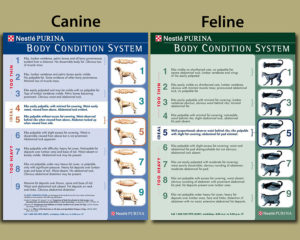How do I know if my pet is the correct weight?
January 5, 2016Written by Dr. Amber Burns
Maybe it is because of the holiday season, but the overall girth of our pets has been weighing a lot on people’s minds. Truthfully, weight is a heavy issue all year round. All puns aside though, we have real reason to want to consider the issue and the consequences for our pets.
So, what is a good weight?
Well, like most things, that question does not have a straight forward answer. All pets have different frames and both sizes and weights can vary. When you see your veterinarian, you may notice posters on the wall that chart size based on a body pattern or physique. These posters show both a side view and a top view of both cats and dogs. Ideally, both will have a wider chest and pelvic region and narrower waistline, similar to an hour glass shape. This is a great frame of reference to start the discussion of size and how it is reflected in your pet.
Health Consequences
Fortunately, I have yet to find a pet that has a body-image problem! However, there are quite a few health consequences that come with being overweight.
- Pets are more prone to:
- Orthopedic problems
- Metabolic problems such as diabetes
- Behavior changes such as reluctance to exercise or rapid onset of fatigue
As we are the controller of their diets and overall food intake, it is our responsibility to make sure that they are regulated well. If that discussion with your veterinarian reveals that your pet is indeed on the heavier side, it will then proceed to a diet and exercise discussion. As with ourselves, weight loss is more successful when done with a team approach so use all the resources you can to make it easier on you and your pet.
